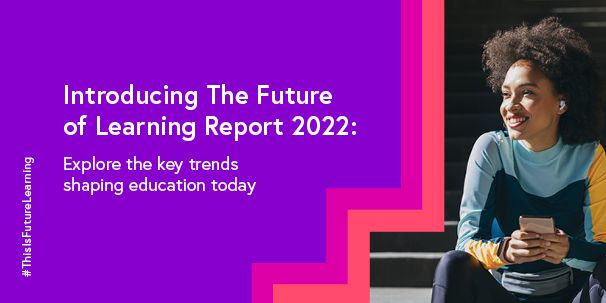Online learning in a post-pandemic world: The Future of Learning Report 2022
Discover how attitudes and approaches towards online learning are changing in the wake of the pandemic.

In a world that has had to adapt significantly over the last two years, we’ve seen broad changes across learning and education. In our Future of Learning Report 2022, we explore how people are thinking differently about education and how new ways of learning are shaping the face of the jobs market.
Here, we discuss some of the trends our research identified and what they could mean for the future of education.
The Future of Learning Report 2022
Our data comes from our recently published The Future of Learning Report 2022. The report uncovers the education motivations, attitudes and behaviours of 2,000 people and more than 500 employers based in the UK. It also details interviews with ten leading education-sector experts to get their take on the trends.
Download the full report now to find out more info about the education trends shaping the future, as well as the skills learners need to future-proof their careers.

A greater shift towards online learning
At the height of the pandemic, online learning became a necessity for many. At points throughout 2020, over a billion children worldwide were unable to go into the classroom. Yet in the fallout from the pandemic, we’ve also seen older generations further embrace online learning.
With The Great Resignation in full swing, 81% of respondents who have changed careers since the start of the pandemic state that an online course helped them make their move. We’re also seeing a thriving gig economy and more people choosing self-employment, highlighting the need for flexible learning across a host of different topics and competencies.
Access to flexible online education gives learners the chance to upskill, reskill or specialise in a field as they strive to reach their career goals. For educators, online courses present an opportunity to demonstrate their expertise and reach an audience that’s eager to learn.
For example, we saw that 32% of respondents wanted to learn something to get a promotion or pay rise. Similarly, 33% would choose online learning platforms to learn these new skills.
The rise of blended learning
The flexibility that comes with new technologies and teaching models doesn’t mean that learners are looking for a solely online experience. Instead, experts from our report feel that blended learning – sometimes termed ‘active learning’ or ‘hybrid learning’ – is a key future approach to education.
They highlight that blended learning combines the best aspects of in-person teaching, such as learner support and informal networking, with the flexibility of online learning.
Data from the report backs this up, showing that 23% of people feel the biggest benefit of online education is the freedom to learn at a pace that suits them. Similarly, the ability to learn from home (22%) and overall flexibility (20%) are also highly rated.
“A one-size-fits-all approach doesn’t fit with our aspirations anymore. We like the idea of being able to learn when we want, how we want, in different spaces – reflecting the changing nature of work.”
– Professor Kiran Trehan, Pro-Vice-Chancellor for Partnerships and Engagement, University of York
A changing emphasis in education
We’ll likely feel the effects of the pandemic for many years to come and in many different ways. So while learners will have new requirements from education, providers will need to ensure they’re addressing these needs.
The experts in our Future of Learning Report 2022 identified several educational opportunities for the future, including:
- New partnerships, such as traditional providers of education working with business partners and delivery platforms
- New models for tertiary education and beyond – a kind of ‘Uber-university,’ where people can get their learning experiences wherever they like.
- Fresh approaches to assessment and exams
- More microcredentials, and further new approaches to accreditation and qualifications in general, reflecting changing needs from learners
- A ‘build your own degree’ approach
- Continued course optimisation for mobile devices
- A growing need for recursive education thanks to constantly changing needs from employers and learners
- The application of new digital technologies, such as artificial intelligence (AI), machine learning (ML), augmented reality (AR), virtual reality (VR) and learning analytics.
It’s clear to see that while traditional forms of education still have their place, there is a general change in attitudes and approaches towards learning, especially when it comes to lifelong learning.
As highlighted by Professor Jonathan Wilson, Professor of Brand Strategy & Culture (Director) at Regent’s University London:
“No job is for life. We can’t rest on our laurels, so it makes sense to continue learning about a wide range of things and explore the possibility of multiple career pathways.”
Greater inclusivity
Our report also highlights the need for more diversity in both the classroom and workplace. Around 30% of respondents to our survey state that race negatively impacts on individuals’ education experiences. As a result, more people would like to see greater diversity in educational settings.
This need for more diversity and representation is also seen in workplaces. Amongst employers, a fifth cite diversity and cultural awareness as a major skills gap in their organisation. This sentiment is echoed by employees, with 36% saying equality and diversity training is something that people in leadership positions should undertake.
However, when we look at peoples’ opinions of what’s standing in the way of learning, respondents felt that there were several aspects of a person’s background that could negatively impact their experience of education.
Some of the biggest barriers to learning amongst respondents include disability (said 33% of respondents), socio-economic background (33%), personal appearance (32%), race 29%), gender identity (26%), and sexuality (25%).
Clearly, there is still a way to go before education is as accessible as it needs to be.
Final thoughts
The findings and topics covered here only scratch the surface of what’s to be found in the full Future of Learning Report 2022. However, it’s clear to see that our concepts of education are changing, and online learning is playing a big part in that.
Raising awareness of the trends, approaches, and barriers to education is an important part of making learning accessible to all who need and want it.




